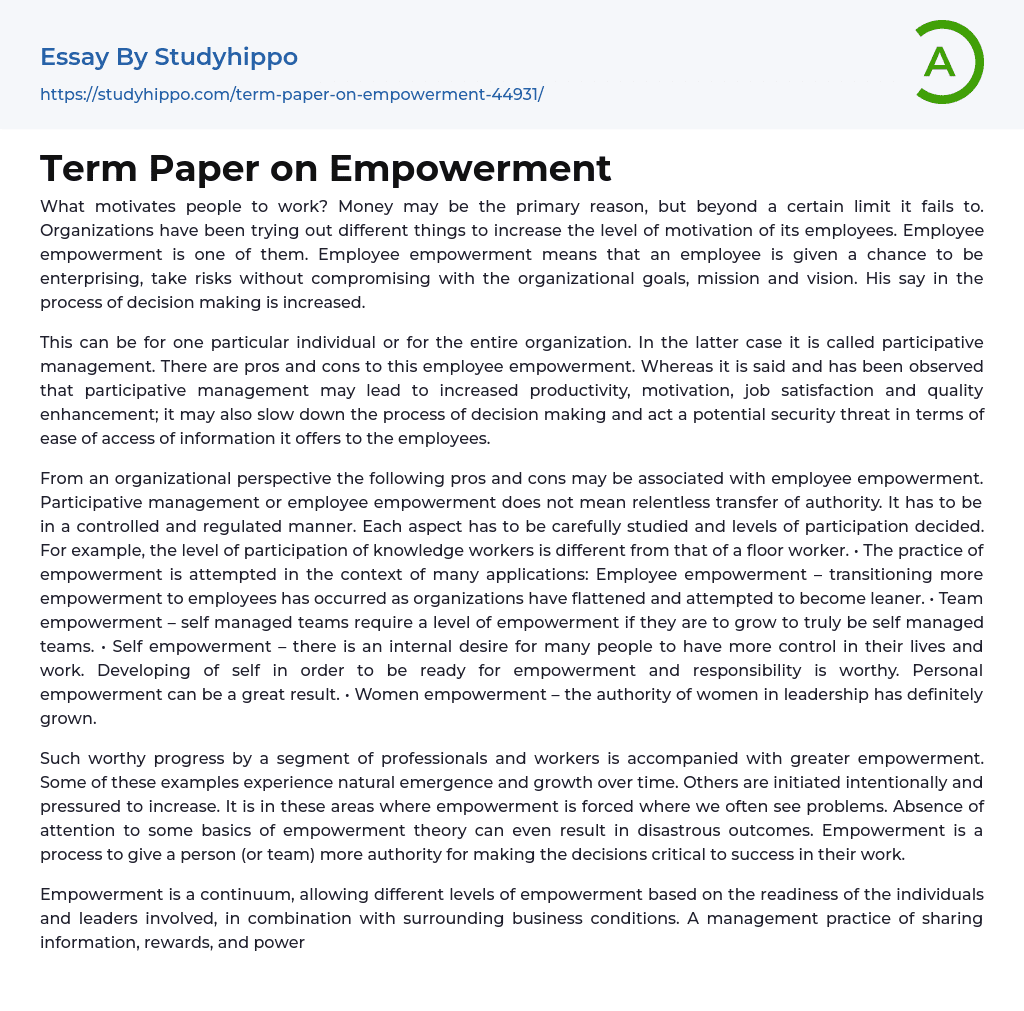Money is typically the primary motivation for people to work, but its effectiveness diminishes over time. To enhance employee motivation, organizations employ various strategies like empowering employees. Empowerment entails enabling employees to be entrepreneurial and take risks while adhering to the organization's goals and values. It also involves granting employees more involvement in decision-making.
Employee empowerment, also known as participative management, can be implemented at both individual and organizational levels. Although this approach offers various benefits such as enhanced productivity, motivation, job satisfaction, and quality, it may also lead to decision-making delays and pose a potential risk to information security due to its employees' unrestricted access.
Empowering employees has both advantages and disadvantages from an organizational perspective. However, it is crucial to implement it in a controlled and regulated manner rather than blindly transferring auth
...ority. The level of empowerment should be carefully studied and determined based on the type of workers involved. For instance, knowledge workers require a different level of empowerment compared to floor workers. The concept of empowerment can be applied in various contexts, such as organizations increasing employee empowerment as they flatten their hierarchies for greater efficiency. Self-managed teams also need empowerment to function independently. Moreover, there is a growing desire among individuals for more control in their personal and professional lives, leading to self-empowerment. Developing oneself to be prepared for responsibility and empowerment can bring tremendous benefits. Additionally, the authority of women in leadership positions has witnessed significant growth, contributing to women's empowerment.
The significant progress made by certain professionals and workers is accompanied by increased empowerment. While some examples of empowerment occur naturally and organically, others are intentionally initiate
and pushed for growth. However, problems often arise in these forced empowerment scenarios. Failure to consider the fundamentals of empowerment theory can lead to disastrous outcomes. Empowerment is a process that grants individuals or teams greater authority to make crucial decisions that contribute to their work's success.
Empowerment is a continuum that allows individuals and leaders to decide the level of empowerment according to their preparedness and the business environment. It encompasses a management practice where information, rewards, and power are shared with employees, enabling them to take initiative, make decisions, and enhance service and performance. Empowerment involves granting individuals the authority to think, behave, act, and have autonomy over their work and decision making. It revolves around feeling self-empowered and assuming control of one's own destiny.
The idea of empowerment is based on the belief that giving employees skills, resources, authority, opportunities, motivation, and the expectation of being responsible and accountable for their actions will improve their competence and satisfaction. Empowerment is closely linked to power, which refers to having legal authority to work towards a specific goal or purpose (Rappaport, 1987). Barbara Solomon (1976, 1985) emphasized empowerment as a social work strategy to address the needs of marginalized African Americans.
Peter Berger and Richard Neuhaus (1977) put forth the idea of empowerment as a means of enhancing welfare services through the mediation of social institutions. Julian Rappaport (1981) further developed this concept theoretically, presenting it as a worldview encompassing social policy and an approach to resolving social problems arising from powerlessness.
The benefits of employee empowerment include increased job satisfaction, motivation, productivity, and cost reduction. Additionally, it fosters creativity and innovation by granting
employees the authority to act autonomously.
- American Dream essays
- Barriers To Entry essays
- Capitalism essays
- Central Bank essays
- Compensation essays
- Consumerism essays
- Economic Development essays
- Economic Growth essays
- Economic Inequality essays
- Economic System essays
- Economy essays
- Employment essays
- Export essays
- Finance essays
- Free Trade essays
- Gross Domestic Product essays
- Human Development essays
- Income Inequality essays
- Industry essays
- Inflation essays
- International Business essays
- International Trade essays
- Macroeconomics essays
- Materialism essays
- Max Weber essays
- Microeconomics essays
- Minimum Wage essays
- Monetary Policy essays
- Monopoly essays
- Pricing essays
- Profit essays
- Recession essays
- resources essays
- Taxation essays
- Trade essays
- Unemployment essays
- Warehouse essays
- World economy essays
- Affirmative Action essays
- Assisted Suicide essays
- Capital Punishment essays
- Censorship essays
- Child Labour essays
- Child Protection essays
- Civil Rights essays
- Corporal Punishment essays
- Death Penalty essays
- Empowerment essays
- Euthanasia essays
- Gay Marriage essays




